Why invest internationally?
New Zealand shares have been a great place to have been invested in recent times. The trouble is, New Zealand represents just under 0.2% of the world’s investment market.1 This means that investing only within New Zealand eliminates over 99.8% of your investment opportunities. In this article, Russell Investments discuss the reasons why global shares and global bonds are essential inclusions alongside domestic allocations. We also present a framework for considering how much of each asset class to devote to international exposure.
Just a little bit of history repeating...
Until the 1990’s, New Zealand investors generally held few international investments. Since then there have been moves to increase exposure to international shares and bonds.
The catalysts for this trend can be attributed to:
- The growth of diversified KiwiSaver funds
- A need to diversify after the 1987 share crash
- Trending globalisation of markets
- Increasing availability of international products
- A realisation that many sectors and investment opportunities are simply poorly represented within domestic asset classes.
International investing is already popular
Most investors today invest a proportion of their assets in international markets. Many have several years of experience with international investment and feel comfortable enough with the concept. With the rise of diversified KiwiSaver funds, investors have unintentionally increased their allocations to international markets. However, many investors do not fully understand the rationale for investing internationally.
Why hold international shares?
1. Reducing risk through diversification
Investing in international shares is simply an extension of the principle of holding shares in your portfolio in the first place. The reason we hold shares is to benefit from the extra expected return they provide over cash and bonds on average (this is known as the equity risk premium).
As we know, investing in equities is generally “riskier” than investing in bonds. So having chosen to accept the risk that comes with investing in shares, investors should seek the most diversified exposure possible. The objective of an investor should be to increase the likelihood of earning a higher premium and reduce the risk of their portfolio. And that means going international.
Different countries have different factors affecting their sharemarkets, and therefore produce different returns (see figure 1). An international investment across multiple countries cancels the ups and downs from each market, reducing risk by smoothing returns.
Obviously, if you knew which market was going to provide the best return, there would be no need to diversify because you could always choose the best investment. In the absence of an investment crystal ball, a well diversified international shares portfolio is the best approach to capturing the equity risk premium, or a higher return, and creating an efficient portfolio in terms of risk and return.
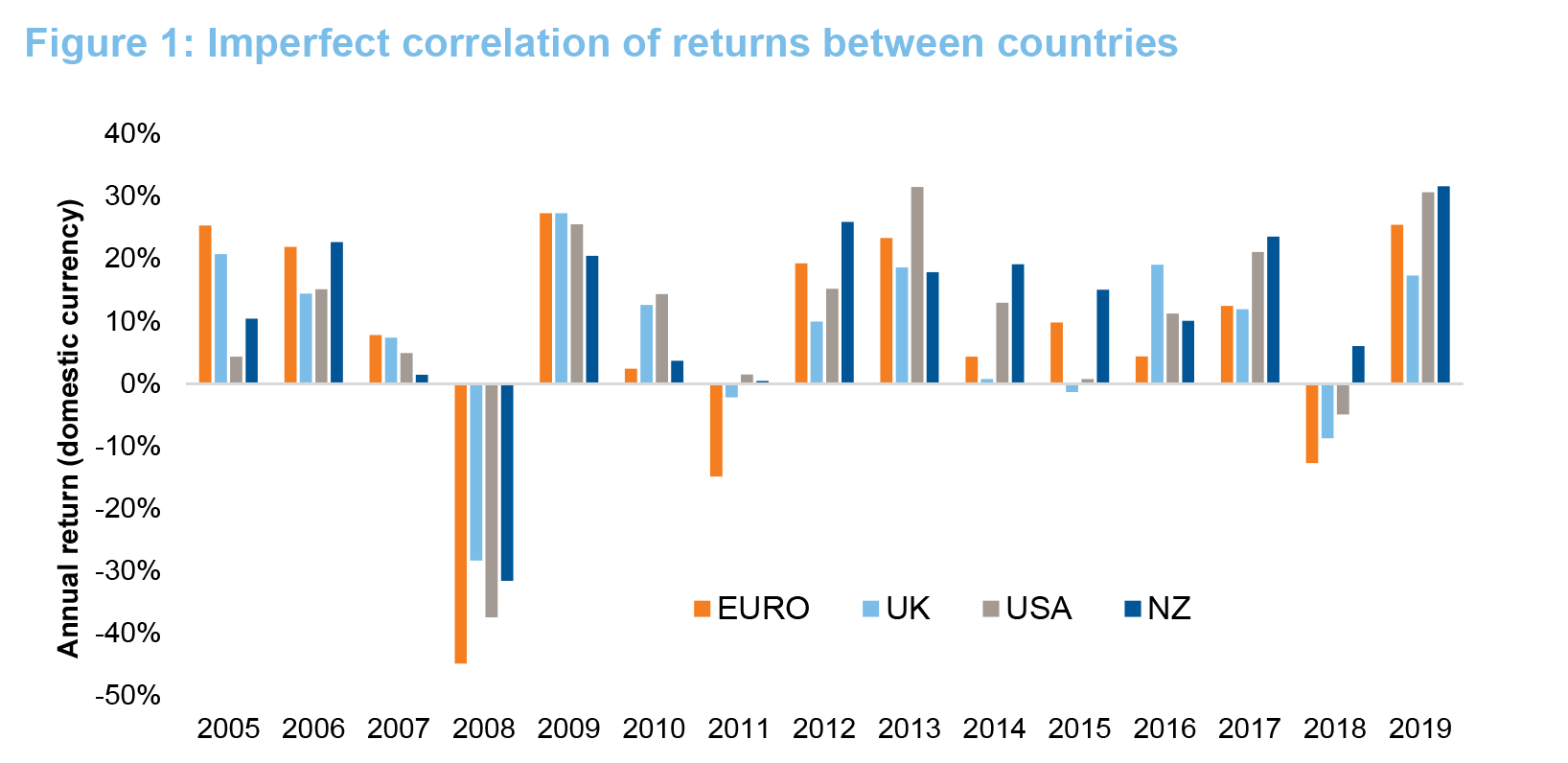
Source: Morningstar. Indices used: MSCI EMU NR, FTSEE 100 TR, S&P 500 NR, S&P/NZX50 Index (gross) and including imputation credits.
2. Filling in the gaps
Investing offshore allows investors to gain exposure to industries or sectors not represented domestically. The sectors of technology, energy and financials for instance, are barely represented in the local market, meaning investors are potentially missing out on the returns generated by companies in these key global sectors.
Figure 2 demonstrates just how different the composition of the New Zealand sharemarket is compared to its international counterpart. For example, some international sectors are not represented at all in the New Zealand sharemarket.
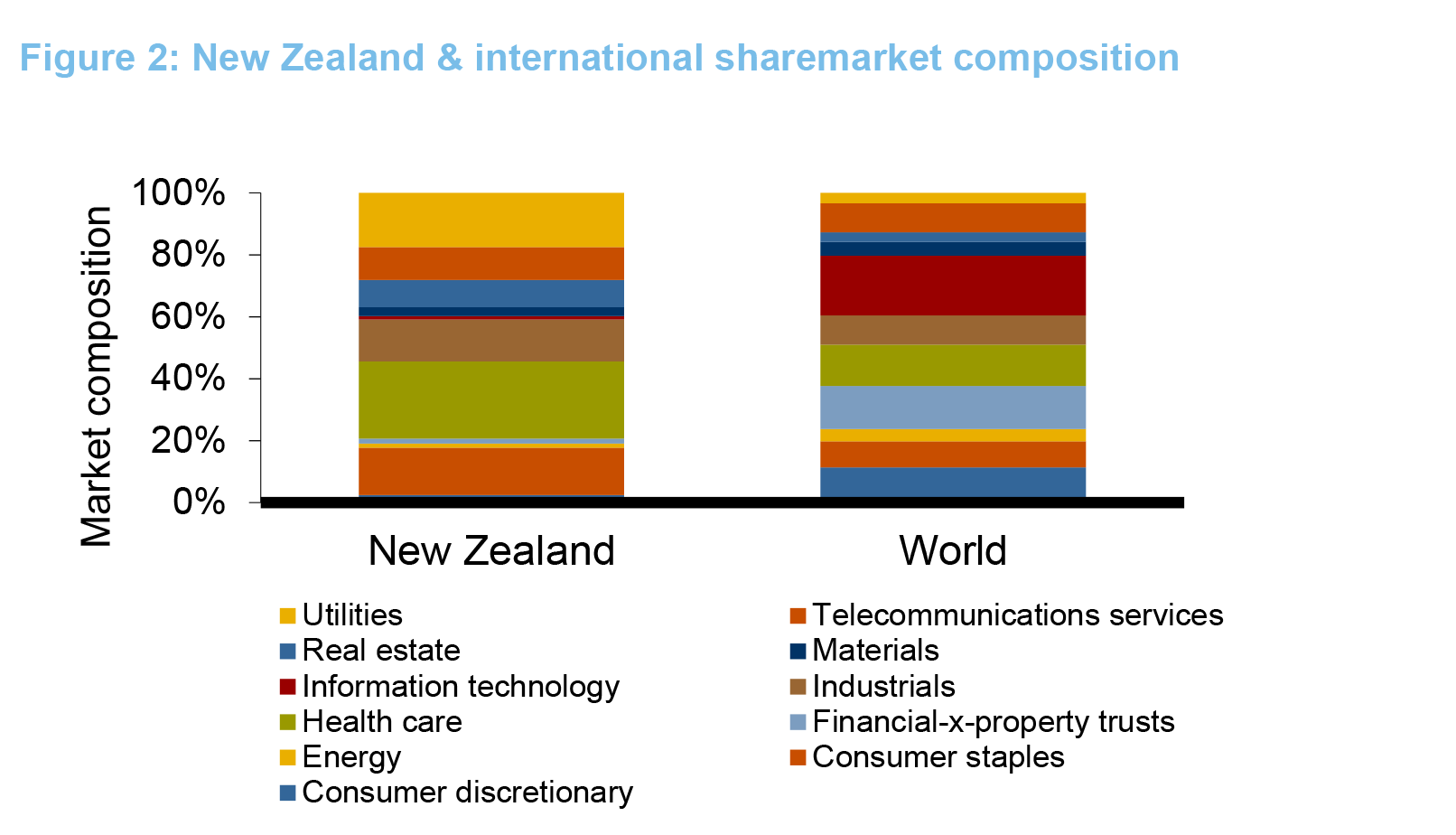
Source: S&P, MSCI as at 30 April 2020.
3. The New Zealand sharemarket is highly concentrated
Having a home country bias is not unique to New Zealand investors. For example, many US investors, invest almost exclusively in their local share and fixed interest markets. But unlike the US, where there are thousands of listed shares and trillions in fixed interest securities, the New Zealand market is relatively small and concentrated in a few sectors. For instance, utilities make up about 19% of the local listed market. This compares with about only 4% within the global market.
There is also a high concentration in and reliance on a small number of companies locally. The 10 largest companies in New Zealand currently make up about 54% of the listed market.
The risk arising from this level of concentration has not been apparent to New Zealand investors in recent years, as the market has performed well. Investors should not forget that these companies could experience bad performance at some point in the future. Therefore, a prudent investor will plan ahead by fully diversifying their shares exposure.
4. A world of opportunities
It’s easy to lose sight of the bigger picture. Did you realise that over 99.8% of the world's investment opportunities lie outside New Zealand?
Next time you’re relaxing on your sofa, listening to the latest music on Spotify, sipping an Asahi, while trying to Google information, ask yourself whether you are sharing in the success of these companies or just contributing to it.
Figure 3 shows a selection of the world’s top rating brands. An investment in New Zealand shares won't give your portfolio exposure to any of these success stories!
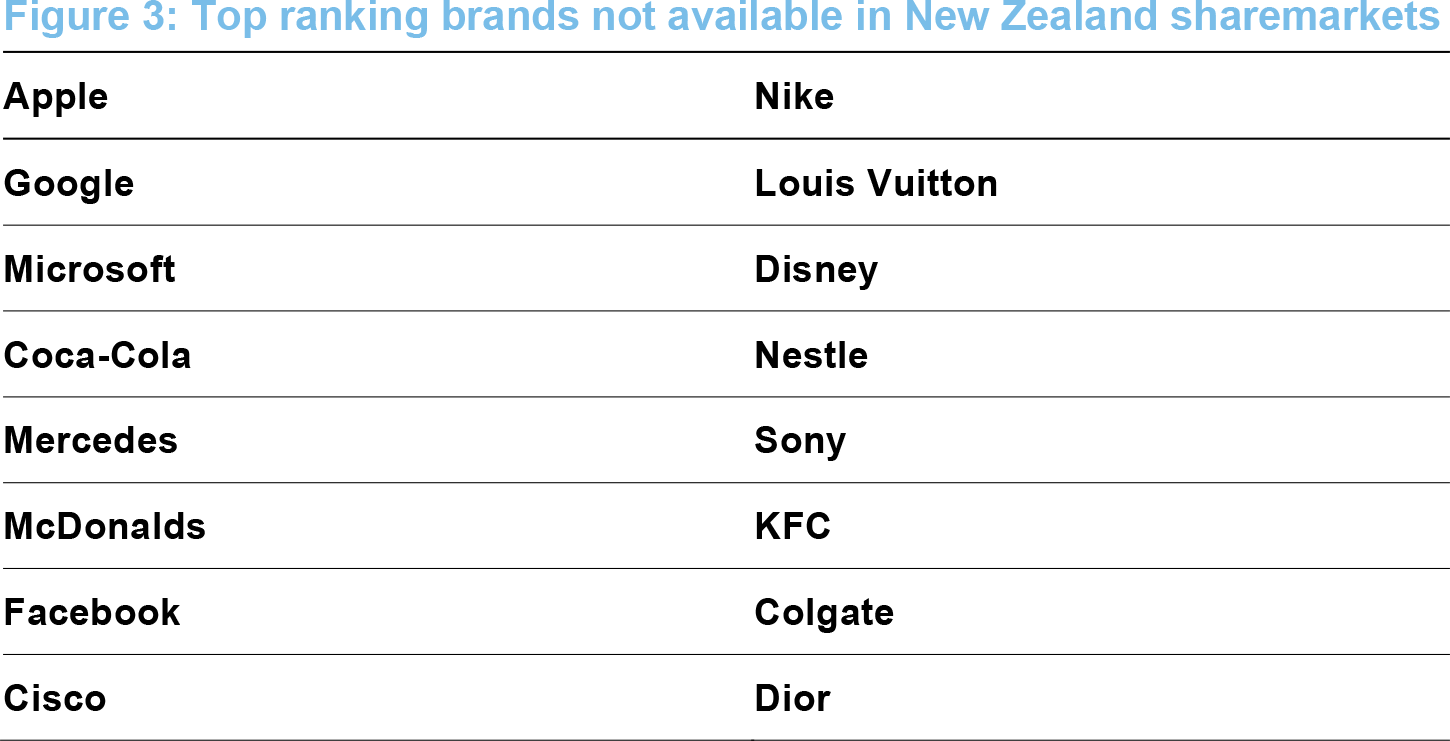
Source: https://interbrand.com/
5. Short term experience hides the benefits
The behavioural anchoring of significant events like historic sharemarket crashes impacts and individual’s memory of the past. People focus firmly on the Global Financial Crisis or the tech bubble, and consider global shares as a risky asset, rather than the long-term positive returns that these markets have generated.
However, as figure 4 shows, the long-term average returns and volatilities of the two are similar. However, given imperfect correlations between the two universes, combining the two into one portfolio can yield more efficient risk/return combinations.
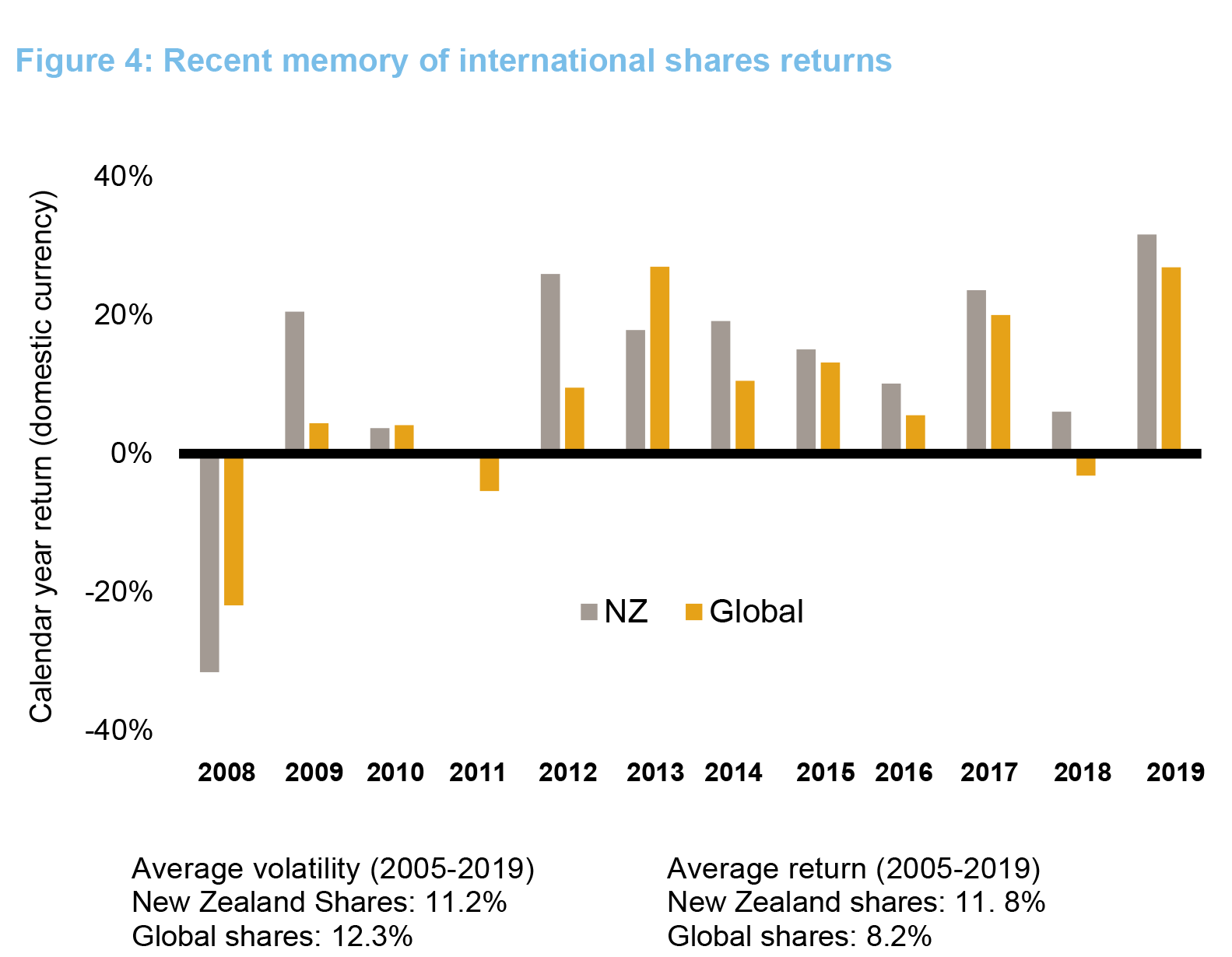
Source: Morningstar, indices used: S&P/NZX 50 Index (gross) and including imputation credits and the MSCI World NR. Returns are calculated in NZD.
Is it worth going international in other asset classes?
International Fixed Interest
The diversification benefits and return potential of international investing are also found in other asset classes, like fixed interest, infrastructure and real estate.
Looking specifically at the fixed interest market, New Zealand makes up only a tiny slice of the global opportunity set, meaning investors that hold only local fixed interest securities are missing out on a range of investment opportunities across many different geographies and sectors. Investors that hold only local fixed interest securities can never be truly diversified in the sense that they are very exposed to the vagaries of the New Zealand economy and its financial markets.
So how much of an asset allocation should be international?
Investors should base their asset allocation on their individual investment objectives, time horizon, and tolerance for risk. Once a target allocation is set for each asset type (eg shares, bonds, property, cash), an investor needs to consider how much of each will be invested domestically and how much will be invested internationally.
The rational approach...
The rational approach to investing in an asset class is to begin with the broadest representation of the market. This approach is grounded in modern portfolio theory.
If investors were to adopt this approach their shares allocation would be similar to that seen in figure 5. This is not the current practice of the majority of investors in New Zealand today.
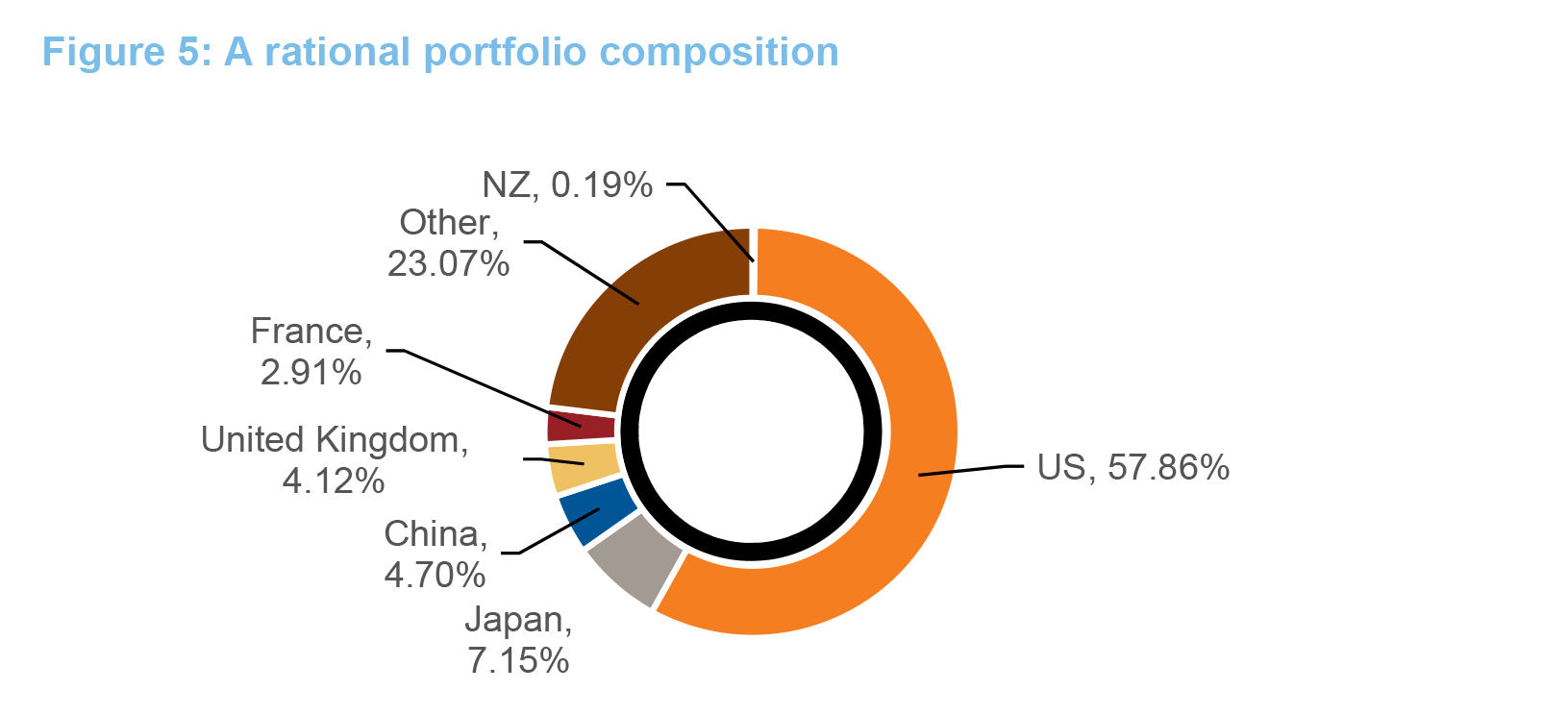
Source: S&P, MSCI as at 30 April 2020. Allocations are proxied for with MSCI ACWI weights. NZ allocation is estimated by dividing the S&P/NZX 50 Index market capitalisation by the MSCI ACWI total market capitalisation, all in USD.
...Is very different to what actually happens
In reality, investors' allocation to international assets are often considerably less than that suggested by the rational, cap-weighted approach.
There are a range of reasons for this home-country bias:
- Familiarity
- Lack of understanding - foreign markets, currency
- Costs
- Legislation
- Tax
Somewhere in the middle
New Zealand investors have steadily increased their allocation to international assets over time. The rational, cap-weighted approach may become standard practice in due course.
In the meantime, a prudent approach may be to include an international allocation somewhere between that recommended by the rational approach, and the current average allocation. Remember that according to the cap-weighted approach, anything larger than 0.1% of your total equity allocation to NZ shares is limiting your portfolio’s diversification.
Russell Investments makes international investing a simple reality
Russell Investments understands the importance of international diversification for all investors and offers a range of diversified fund solutions. The Russell Investments Global Opportunities Fund and the Russell Investments Global Bond Fund give all investors easy access to international equities and bonds. Additionally, the Russell Investments Global Listed Infrastructure Fund, provides investors with exposure to the high yielding and defensive infrastructure asset class.
All Russell Investments funds are Multi-Manager, Multi-Style and are the result of a worldwide manager research platform that evaluates over 13,000 investment manager products. Only the best-of-the-best receive an assignment in a Russell Investments fund.
Russell Investment’s unique approach with its added levels of diversification make the Russell Global Opportunities and Global Bond funds a good core investment for any portfolio.
1 The portfolio allocation to NZ equities is approximately 0.2% within the MSCI All Country World Index as at 30 April 2020.